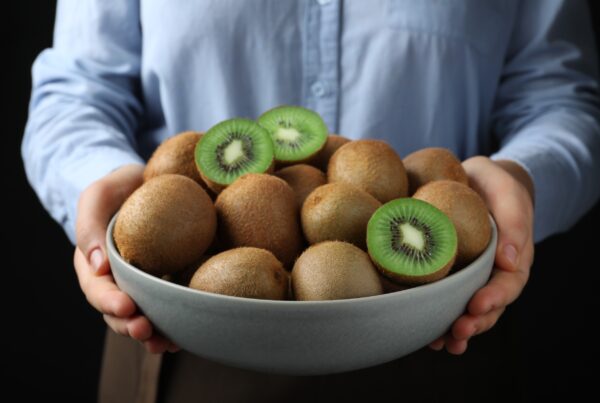”Question: Can I use food to improve my brain function?
Reading time: 6 Minutes
MWi Hack:
- Learn about how to support brain health with nutrition and how to incorporate better eating habits.
MWi Summary:
- Three proven eating patterns that improve brain health are the Mediterranean diet, DASH diet, and MIND diet.
- The Mediterranean diet focuses on healthy fats, fruits, vegetables, legumes and less dairy and red meat.
- The DASH diet focuses on a reduced consumption on carbohydrates and sodium.
- The MIND diet focuses on whole grains, green leafy vegetables, berries, and fish.
- Starting a new diet can be overwhelming. You can start with some small changes:
- Use olive oil instead of butter.
- Limit alcohol.
- Give yourself grace!
The foods we eat play a critical role in regulating everything in our bodies. From mood to physical functioning, we know that a healthier diet can protect cognitive function while also improving other aspects of health. Researchers, including numerous BrightFocus Alzheimer’s Disease Research (ADR) grantees, are studying what foods have a positive (and negative) impact on brain health as we age.
The answer lies in eating foods that benefit the whole body, as the brain is affected by multiple bodily systems, including the cardiovascular, immune, endocrine, and digestive systems. Risk factors for stroke and heart disease are strongly connected to risk factors for dementia because the brain utilizes the energy supplied by the vasculature to function. Therefore, the types of diets recommended for brain health are the same diets that are good for preventing heart disease and stroke, explained Dr. Kenneth Mukamal, MD, MPH, research faculty at Beth Israel Deaconess Medical Center and Associate Professor in Medicine at Harvard Medical School.
By eating this way, you’ll be able to improve several areas of your health at once.
“Much of what we recommend for healthy diet for brain health is intended to help keep not only your brain, but also your heart and blood vessels, working as well as possible. When they work well, we know that improves the likelihood that your brain will work well also,” Dr. Mukamal said.
This brain boost smoothie is delicious, easy to make, and packed with brain-healthy flavonoids, vitamins E and K, folate, and curcumin. See this recipe and more at brightfocus.org/recipes.
With complex diseases like Alzheimer’s and dementia, identifying and understanding the potentially modifiable lifestyle factors to reduce risk are a major research mission, said Majken Jensen, PhD, Adjunct Professor of Nutrition at Harvard’s T.H. Chan School of Public Health and recipient of a BrightFocus Alzheimer’s Disease Research (ADR) grant. “If we could identify changes to diet and lifestyle that could alter the risk of dementia, it could potentially have a very large impact.”
The Best Foods for Brain Health
When considering the best foods for brain health, your overall eating pattern—what you eat and drink on a regular basis—has a much greater impact than eating more of one single food, Dr. Mukamal said. Instead of looking for one single food that will cure everything, look for a whole, healthy diet eating pattern that fits with your lifestyle.
Three proven eating patterns for brain and overall health are the Mediterranean Diet, the DASH Diet, and the MIND diet, which studies have linked to a reduced risk of Alzheimer’s. Each of these emphasizes limiting red meat and focusing on whole grains, fruits, vegetables, fish, nuts, and olive oil and avoids saturated fat. Dr. James Ellison, a geriatric psychiatrist at the Swank Center for Memory Care and geriatric consultant at ChristianaCare, described the diets as follows:
Mediterranean Diet:
Named for its emphasis on traditional foods eaten in countries surrounding the Mediterranean Sea, such as Greece, Italy, Spain, and France, this diet incorporates plenty of healthy fats like olive oil, fresh fruits and vegetables, legumes, nuts, and less dairy, red meat, butter or margarine, sweetened beverages, and pastries.
DASH Diet:
Proposed by the National Heart, Lung, and Blood Institute, the Dietary Approaches to Stop Hypertension (DASH) Diet emphasizes many of the components in the Mediterranean Diet in addition to a reduction in overall consumption of carbohydrates and sodium. It has been shown to reduce blood pressure and may be particularly beneficial for people with cardiovascular disease.
MIND Diet:
A hybrid of the Mediterranean and DASH diets, the MIND (Mediterranean-DASH Intervention for Neurodegenerative Delay) Diet was developed specifically for brain health and has been shown to slow down cognitive decline. The MIND Diet emphasizes whole grains, green leafy and other vegetables, berries, fish, poultry, beans, nuts, and olive oil while minimizing the intake of red meats, butter, margarine, cheese, fast foods, and sweets.
While all the eating patterns mentioned have proven benefits for brain health, the MIND Diet has shown particularly impressive results for aging. One study found that adherents to the MIND Diet demonstrated more successful cognitive aging and the MIND Diet provided even better protection against Alzheimer’s disease than the DASH or Mediterranean diets. Another study showed that the MIND Diet can slow your brain aging by 7.5 years.
The MIND Diet is a good bridge between the Mediterranean Diet, which may feel foreign to American palates, and the original DASH Diet explained Dr. Mukamal. Similar to what people “living off the land” would eat, it is a plant-forward diet, emphasizing plant-based foods but not excluding animal products like poultry and high omega-3 fatty fish like salmon. It includes:
- protein-rich legumes, beans, and nuts;
- high omega-3 fatty fish, like salmon; and
- fruits and vegetables, particularly dark-colored berries and green leafy vegetables.
Start with easy wins
By choosing the eating pattern that works best for you, you can find foods that you enjoy, making it more likely you will eat them regularly.
“For example, white meat poultry, a standard part of the DASH and MIND diets, is available pretty much everywhere, and most people like it,” Dr. Mukamal said.
Other easy wins include swapping out olive oil for butter or margarine when cooking.
“I recommend focusing on the parts of the diet that are easiest to swap out early, and as you find yourself eating better and better, incorporate more swaps,” he said.
Dr. Mukamal recommends men under age 65 limit alcohol to two drinks a day and that women and men over 65 limit alcohol to one drink per day.
And, of course, everything in moderation.
“As long as you don’t overdo it, it is possible to fulfill your urges for snacks with healthier choices like dark chocolate, raisins, or nuts, without going overboard and messing up your diet,” Dr. Mukamal said.
Finally, give yourself grace. There’s a lot working against us in our everyday environments—think fast food and packaged snacks—to make eating easy and convenient at the expense of nutrition. Shopping in grocery stores that carry a full range of items versus a corner store with mostly packaged foods, eating a snack before grocery shopping so you’re not starving, and coming up with a shopping list are all ways to help stick to your plan and make sure you are getting the right nutrients.
About BrightFocus Foundation
BrightFocus Foundation is a premier nonprofit funder of research to defeat Alzheimer’s, macular degeneration, and glaucoma worldwide. Through its flagship research programs—Alzheimer’s Disease Research, National Glaucoma Research, and Macular Degeneration Research—the Foundation is currently supporting a $75 million portfolio of 287 scientific projects worldwide. BrightFocus has awarded nearly $275 million in groundbreaking medical research funding since its inception and shares the latest research findings, expert information, and bilingual disease resources to empower the millions impacted by these devastating diseases worldwide. Join our community at brightfocus.org.
MWi would like to thank Julia Roth for sharing these insights with our community. Click the button below to go to the original article:






